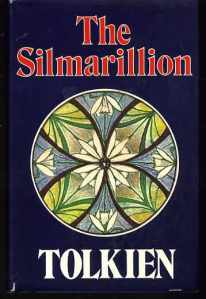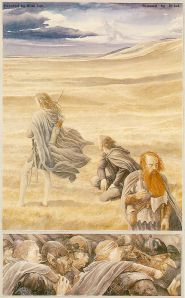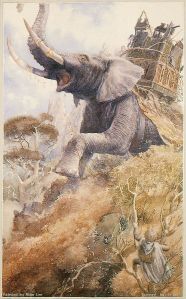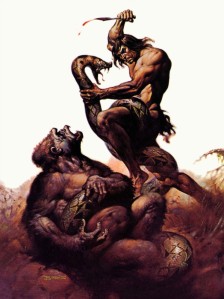Racism and Tolkien
[Images, Top to Bottom: The Silmarillion cover; The Five Races – Dwarf, Human, Elf, Orc, Hobbit; An Oliphaunt; Valinor, the Westernmost land; Cover of ERB’s Tarzan, Lord of the Jungle. The 2nd and 3rd images are by John Howe. 4th image is by Ted Nasmith. Last image is by Boris Vallejo.]
 Growing up, I was a big fan of some of Tolkien’s works. I started with the Lord of the Rings, which I had heard a lot of hype about. I bought the trilogy at Calcutta’s great book fair, which used to be one of the high points of my year: at par with Diwali and other festivals. Having bought it, I struggled to get through the first book; its pace was too slow for me. On my second attempt I managed to get through the first book, and then found the next two impossible to put down. I’ve since read LotR about 5 or 6 times; and I’ve also read The Hobbit and The Silmarillion, and admired the early Tolkien-inspired artists. These are among my favourite books, evoking a sense of fantasy and romance that the multitudes of more recent pretenders fail to. Yet, they are not without their faults.
Growing up, I was a big fan of some of Tolkien’s works. I started with the Lord of the Rings, which I had heard a lot of hype about. I bought the trilogy at Calcutta’s great book fair, which used to be one of the high points of my year: at par with Diwali and other festivals. Having bought it, I struggled to get through the first book; its pace was too slow for me. On my second attempt I managed to get through the first book, and then found the next two impossible to put down. I’ve since read LotR about 5 or 6 times; and I’ve also read The Hobbit and The Silmarillion, and admired the early Tolkien-inspired artists. These are among my favourite books, evoking a sense of fantasy and romance that the multitudes of more recent pretenders fail to. Yet, they are not without their faults.
Racial Aspects

One negative aspect of Tolkien’s works is the racial division in the books. Races in Tolkien’s universe seem to have inherent morality. This morality is often expressed in terms of light and darkness, fairness versus swarthiness. It isn’t impossible for elves to be evil, but they are overwhelmingly good. Men are good as long as they throw their lot in with the West, and evil if they choose the East. The evil men are swarthy, the good men are fair. Orcs are inherently, irredeemably evil. Though intelligent, they are not dignified with a personal pronoun such as he or she; an orc is just “it”. Common notions of justice don’t seem to apply to them: if a “good” person sees an orc he is justified in simply killing it. In the Silmarillion, the superiority of humans in which Numenorean blood runs true is made quite explicit. Men of that race (Aragorn was one of them) have longer life, but also have deeper vision and can comprehend things lesser mortals cannot. They can create wonderful things that less men can’t. Beyond these, a second look at LotR and The Silmarillion reveals that Tolkien’s works presents fears and prides from Western culture. A common tragic theme is that of a small (Western) population valiantly but hopelessly battling vast hordes of ravening Easterners. (In the movies, the Oliphaunts – elephants – versus horses battles take this West vs. East rivalry another step further. But this isn’t attributable to Tolkien.)

East vs. West
The East/North vs. West/South aspect of Tolkien’s writings is bothersome and also peculiar. This goes beyond the story in his book, where of course Mordor lies to the East. Tolkien’s phrasing implies no dissociation between evil in the East and the East itself. The sense is that there is something inherently bad about lands that lie East, as if the compass direction is itself imbued with an immanent malevolence. There is a similar implication for the South (Southrons, for example) though this isn’t fleshed out as much.

Defenses of Tolkien
The question of racism in Tolkien’s works is pretty old. A search on google turns up several links on this topic; most defend Tolkien. The Wikipedia article on the Lord of the Rings mentions several encyclopedia articles defending Tolkien. Christine Chism writes (J. R. R. Tolkien Encyclopedia, Racism, Charges of):
Critics who accuse Tolkien of racism fall into three camps: those who see him as intentionally racist; those who see him as having passively absorbed the racism or Eurocentrism of his time; and those who, tracing an evolution in his writing, see him becoming aware of a racism/Eurocentrism implicit in his early works and taking care to counter it in his later ones.
I believe the defenses of Tolkien can also be classified into three categories. Some say Tolkien was born during a racist time and his works should be seen in that context; he wasn’t especially racist. Some provide anecdotes from his works where a member of a fair/Western race is evil, and say this proves Tolkien wasn’t racist. The remaining is a miscellaneous catch-all category, including such peculiar explanations as “Tolkien was a Christian, hence couldn’t have been a racist”.

I would tend to agree with the first defense, which actually admits the racism. Other writers of that period have similar attitudes. (For example, the works of Edgar Rice Burroughs, the creator of Tarzan, would be unpublishable now. The racist content of ERB’s Tarzan or his Mars and Venus books is explicit and clear.) While this does implicate Tolkien, his racism was perhaps milder than that of his peers the British, who held a number of juicy and choice racist opinions about Indians. He was certainly less of a racist than Winston Churchill.
The second defense cites examples such as Saruman or the Numenorean kings who turned evil. Since there exist some members of the “noble races” who are evil, Tolkien’s defenders argue, Tolkien didn’t think the noble races were actually noble. This defense is silly and is invalid for several reasons. First, the only “crime” of Saruman and the Nazgul was to side with the East. As such, their evilness presupposes the goodness of the West. It’s a cyclical argument. Second, one or two bad apples change nothing. Tolkien’s construction still attributed much racial nobility to the Western races.
In Lieu of Summary…
So does this mean I won’t read Tolkien’s books again? Nope, and there’s no bitterness either. Tolkien remains a great storybuilder. Before his works, the West had a few mythologies but these were before Europeans came into conflict with the rest of the world. As a result they are Eurospecific. Tolkien’s mythology is perhaps the first in the Western world that includes the aspirations and fears of the West that arise from conflict with other, distinctly non-Western cultures. This might explain why so many Westerners can viscerally identify with it. For me, it is simply the high fantasy, the detailed mythology and the restrained profundity of the events.
Interestingly, the Silmarillion is far more nuanced in its East/West and race issues.
To begin with, the Dark Lord, Morgoth dwells in the North, rather than South or East.
Secondly, the Elves are not automatically all good as in LOTR. There are considerable tensions between them.
The Noldor who return from Valinor, feel superior to the elves who have remained in Middle Earth, and this is much resented. At the same time, the Noldor themselves carry a curse, dooming all their endeavours to destruction.
Thingol, King of Doriath, is perhaps the most racist character in the book. In fact, he is racist against all Men, and doesn’t even take mortals into his service.
Yet he is forced to reconsider his views when Beren wins the love of his daughter and rescues a Silmaril from Morgoth’s crown.
Overall, I’m beginning to like the Silmarillion more and more. I think of it more as an outline on which more stories can be built rather than a complete story. Viewed that way, it has some very haunting and compelling qualities.
Hmmm, maybe a blogpost is due ?
Bekaar BokBok:
You make good points. But although The Silmarillion was compiled from J.R.R.’s writings, it was substantially written — or at least edited — by Christopher Tolkien at a time when racism had become less fashionable.
Also, a substantial part of its conflicts deal with elf and “good” human history — i.e., we don’t see so many orcs. There’s not that much reason to depict evil orcs and humans. Here we have characters like Glaurung, Ungoliant and Morgoth taking on the evil mantle.
You’re right in saying The Silmarillion is less racially-rooted than LotR, but maybe it’s not as relevant to the question of whether Tolkien was a racist. It doesn’t have as much evidence for or against the hypothesis!
See, I have this theory that Tolkien was a big fan of America.
It seems he claimed that Middle Earth is a mythical ancient version of our world, and the Shire is clearly England.
So, if the western lands of Middle Earth are Europe, and the evil East and South are Asia and Africa, what is Valinor ? 🙂
Bekaar BokBok:
Ha! If so he had early premonitions of America’s greatness — I think the rest of the world didn’t think much of the USA until the late 1930s…
And then we have the common perception of how two historical figures from the past are viewed – Alexander and Genghis Khan – the former almost always with adulation and admiration, whereas the latter as bloodthirsty.
Kaffir:
Absolutely correct. I can see no reason to present Alexander as great and Genghis as uncivilized/evil/abhorrent/scary/immoral, except if you accept the Western paramountcy as an axiom.
Kaffir and co,
In some respects things are changing. For example, remember how there used to be books glorifying the crusades and talking about the ‘evil saracens’ ?
Now, however, its generally acknowledged, even in the west, that the crusades were a barabric and unprovoked attack on a highly civilized middle east. So its improving.
Alexander vs Chengiz Khan – I’m not sure. From whatever I’ve read, Chengiz Khan and Timur Lang, perpetrated mass massacres and atrocities on a scale way beyond Alexander.
But of course, this was all from English books, so might be part of evil western propaganda. 🙂
But at least, Timur’s massacre in Delhi is well documented by Indian historians, so here’s a ‘reliable’ source….
Apropos of Alexander, I just came across this interesting article, which questions quite a bit of the stuff we know about Alexander: http://arvindsharma.wordpress.com/2008/02/03/19-what-should-one-think-of-alexander-the-great/ . Other entries on that blog are also great reading.
Thanks. I’ve been a regular reader of Arvind Sharma’s blog for a while. Thought-provoking posts.
Arvind Sharma also has some piquant analytical stuff about the Mahabharata and various other aspects of Hinduism. Like his post on the difference between the ethical stance in the Ramayana and the Mahabharata. I think his blog will keep me interested for some time to come!
A very interesting article, but somehow I am not convinced either way of the racial angle. Sure, it is an imperialistic world-view and reflected the times he lived in, but I don’t think racism is such a definite aspect of LoTR that it can be ascertained that the author was in fact racist…
I haven’t read his other works, but LoTR doesn’t come across as racist. Some parts of it reflect the imperialist view and I actually feel that his “east/west” divide was merely a geographical plot device and nothing more sinister than that.
By the way, looking up “racist” vs. “racialist” throws open a lot of discussion. What exactly is the difference between those two terms?
Hari:
Proof of course is hard, but there’s evidence aplenty as I’ve pointed out. I guess the only objective test of racism is whether something gives offense. In that sense I think the fact that so many people have raised this issue hints that there’s something there we should think about. But like I said in the article, Tolkien comes across as not *especially* racist.
There’s something else I didn’t mention in the post. I think Tolkien imbues his “fair” races with qualities and a history that the “fair” races in our world can especially identify with. Many others can, too, but it seems to be a very “white” mythology.
As far as the racial vs. racist division is concerned: I’m not sure whether these are common terms, but here’s how I view them. Racism is primarily concerned with the superiority of one race over another. Racial (apart from being an adjective) in my mind refers to a focus on one race over another, i.e. a focus on the wonderfulness of the one race, though not in comparison to other races. I tend to think of LotR as mildly (but excusably) racist. The Silmarillion should be called racial rather than racist because it is about a certain race and its aspirations and desires and fears, but isn’t so much about comparative superiority.
This got me reading all over the Internet and at the end of it all, I’ll go with the ‘not especially racist’ thesis, as opposed to overtly racist like Kipling or Edgar Rice Burroughs.
Tolkien certainly had an especial fondness for ‘the northern spirit’ which he contrasts favourably with the ‘southern spirit’. But by this, he means Northern versus Southern Europe. And as a result, some Neo-Nazis have claimed Tolkien as one of their own !!
Also, one must remember that black vs white, dark vs fair, east vs west have been very traditionally associated with evil vs good in western mythology, and that’s where Tolkien’s writing is rooted.
But yes, the association occurs often enough to be somewhat annoying, once you are sensitized to it.
Tolkien is not a racist. However, he was a devout Catholic.
LOTR is most obviously a Catholic allegory glorifying the Crusades, not WWI or WW2.
It’s a story based on a piece of history.